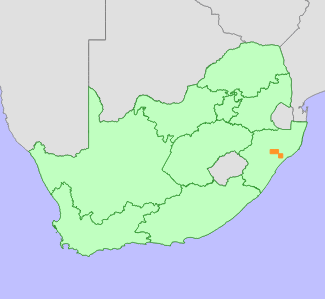|
Scientific Name | Acalypha entumenica Prain |
Higher Classification | Dicotyledons |
Family | EUPHORBIACEAE |
National Status |
Status and Criteria | Endangered A2c |
Assessment Date | 2008/07/07 |
Assessor(s) | L. von Staden & C.R. Scott-Shaw |
Justification | A long-lived, suffrutescent grassland forb, with a generation length of at least 50 years. It is known from two well separated locations that have been extensively transformed by cultivation and forestry plantations and a population reduction of at least 50% is estimated based on habitat loss at these locations since the first collection was made in 1888 (two to three generations). It is probably extinct at one location, and searches of areas of suitable habitat between the two sites have failed to locate other subpopulations. It is therefore listed as Endangered under criterion A. |
Distribution |
Endemism | South African endemic |
Provincial distribution | KwaZulu-Natal |
Range | This species occurs in Qudeni and Entumeni, central KwaZulu-Natal. |
Habitat and Ecology |
Major system | Terrestrial |
Major habitats | Midlands Mistbelt Grassland, Moist Coast Hinterland Grassland |
Description | Plants grow in mistbelt and Ngongoni Grassland on dolerite, 850-1 600 m.a.s.l. |
Threats |
| The two sites where this species is known from are both in highly transformed areas. Grasslands in the entire area of about 5-10 km surrounding Entumeni, where the type collection was made in 1888, are transformed for the cultivation of crops and forestry plantations. The second site where this species was found is in a fire break surrounded by forestry plantations. It is estimated that at these two sites, at least 50% of the habitat is irreversibly transformed. However, the sites are some distance apart, and the intervening areas are not as highly transformed, but it is not known whether this species occurs in this area or not. On the one hand, this is a fairly poorly explored part of KwaZulu-Natal, but on the other, searches in suitable habitat at other areas near Qudeni have failed to locate any further populations (Scott-Shaw 1991, 1999). |
Population |
Population trend | Unknown |
Notes |
| Germishuizen et al. (2006) lists this taxon as a synonym of E. glandulifolia. This is however not based on any publication where this taxon is formally taken into synonymy with E. glandulifolia, and it is therefore assessed as a valid taxon. |
Assessment History |
Taxon assessed |
Status and Criteria |
Citation/Red List version | | Acalypha entumenica Prain | EN A2c | Raimondo et al. (2009) | | Acalypha entumenica Prain | EN B1,B2abcd | Scott-Shaw (1999) | | Acalypha entumenica Prain | Vulnerable | Hilton-Taylor (1996) | |
Bibliography |
Germishuizen, G., Meyer, N.L., Steenkamp, Y. and Keith, M. (eds). 2006. A checklist of South African plants. Southern African Botanical Diversity Network Report 41 SABONET, Pretoria.
Raimondo, D., von Staden, L., Foden, W., Victor, J.E., Helme, N.A., Turner, R.C., Kamundi, D.A. and Manyama, P.A. 2009. Red List of South African Plants. Strelitzia 25. South African National Biodiversity Institute, Pretoria.
Scott-Shaw, C.R. 1991. A taxonomic revision of the Acalypha peduncularis E.Mey ex Meisn. (Euphorbiaceae) complex in southern Africa. Unpublished M.Sc., University of Natal, Pietermaritzburg.
Scott-Shaw, C.R. 1999. Rare and threatened plants of KwaZulu-Natal and neighbouring regions. KwaZulu-Natal Nature Conservation Service, Pietermaritzburg.
|
Citation |
| von Staden, L. & Scott-Shaw, C.R. 2008. Acalypha entumenica Prain. National Assessment: Red List of South African Plants version 2024.1. Accessed on 2025/12/23 |
 Comment on this assessment
Comment on this assessment


